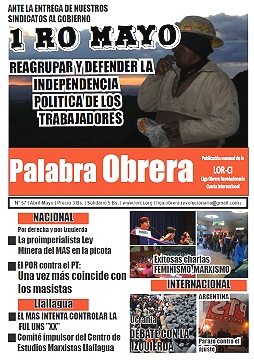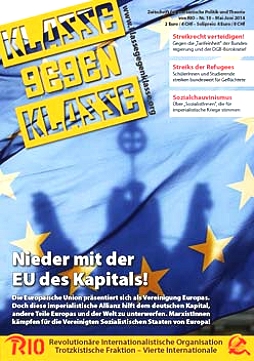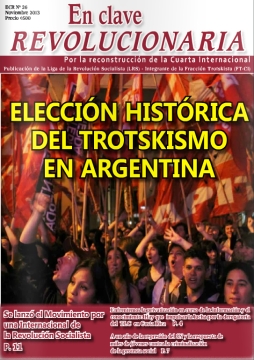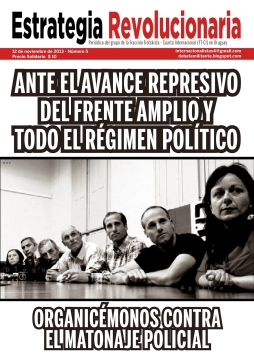Egypt
“The people want the regime to fall”
12/12/2012
By Claudia Cinatti
The old slogan, that hundreds of thousands were shouting against the Mubarak dictatorship at the beginning of 2011, is again resounding with all its force in the streets of Cairo and the main cities of Egypt, this time directed against the government of M. Morsi and the Freedom and Justice Party (linked to the Muslim Brotherhood) and the Constituent Assembly with a majority from Islamist parties.
For two weeks now, hundreds of thousands of middle-class young people, students, women, workers, groups of the poor, have been mobilizing against the decree by which the Egyptian President allocated quasi-dictatorial powers to himself, in order to try to consolidate an authoritarian regime dominated by moderate Islamism and backed by imperialism, in exchange for the services rendered by Morsi to achieve the ceasefire between Hamas and the State of Israel.
Far from retreating in front of the protests, Morsi’s response was to force the approval, in record time, of the draft of the new constitution and call a constitutional plebiscite for December 15, hoping that the national extension of the Muslim Brotherhood and its networks of clients among the poor would allow his winning the vote, even though by a narrow margin.
This offensive action by Morsi precipitated the dynamics of the mobilization: on December 4, tens, perhaps hundreds of thousands, surrounded the Presidential Palace, forcing Morsi to leave the building secretly. On December 5, the Muslim Brotherhood summoned the government’s Islamist base to a “counter-mobilization,” triggering violent confrontations between both sides, with rocks and Molotov cocktails, with a provisional outcome of 3 dead and hundreds of wounded. For now, the army has not been participating in repressive assignments, trying to protect itself, as it did in view of Mubarak’s downfall. At press time for this article, the confrontations were continuing in the vicinity of the Presidential Palace and in other big cities of the country. If this situation of extreme tension grows worse, it could call into question the continuation of Morsi’s government and the “democratic transition” as a way of diverting the revolutionary process.
A Constitution tailor-made for Islamism, the military and imperialism
The new Constitution, a result of a completely anti-democratic constituent process, agreed upon with the Supreme Council of the Armed Forces, is an attempt to consolidate a regime based on the alliance of the Muslim Brotherhood (and, secondarily, other versions of Islamism, like the Salafists) with the military and imperialism, that will replace the old Mubarak dictatorship with a “guided democracy” that will retain the essentials of the old regime.
Among other things, the new Constitution proclaims Islam as the state religion (which was already in force in the previous Constitution and under Mubarak), declares the principles of Islamic law as the source of legislation, keeps the armed forces as a main institution of the regime, leaving to the military, control of the defense budget (to which, 1.3 billion dollars goes in, as financial aid from the United States) and the management of military affairs, as well as basically respecting the role of the armed forces in the economy and keeping the hated military tribunals to pass judgment on civilians (before which, some 12,000 activists have been prosecuted since the end of the dictatorship).
This Bonapartist turn has a dual purpose: on the one hand, it is intended to decide the dispute the government has with the judiciary, where the remainder of the old regime is concentrated, and, on the other, to do away with the resistance of the young people and advanced groups of the working class. As part of the policy of keeping the working class under control, Morsi’s government, with a demagogic measure of cleansing the union federation of the old pro-Mubarak leadership, issued a decree by which it removes the old leadership, but gives the Minister of Labor, a member of the Muslim Brotherhood, the authority to name a new leadership, thereby destroying any possibility of democratizing the workers’ organizations, a very heartfelt demand by broad groups of the workers who have been founding independent unions.
In this way, the government is trying to smooth the path for moving forward with the implementation of a neoliberal austerity program, negotiated with the IMF, in order to unload the consequences of the capitalist crisis on the groups of the poor and reassure potential foreign investors of business opportunities.
The Muslim Brotherhood and its political arm, the Freedom and Justice Party, are acting with the support of the United States and other imperialist powers, that see Egyptian moderate Islamism as an ally – together with Turkey, Qatar and Saudi Arabia, and the State of Israel – for maintaining regional stability and doing away with the revolutionary tendencies of the Arab Spring. For this reason, as the daily Washington Post explains, “the United States has refused to criticize Morsi publically or directly condemn the proposed Constitution,” which has clearly been seen in the statements from the US Secretary of State, Hillary Clinton, who merely called for dialogue and that the new Constitution should guarantee that Egypt will fulfill its “international obligations,” that is, maintain its alliance with the United States and the Zionist State.
Between the Popular Front and the prospect of revolution
This new wave of struggles faces big challenges. The enormous polarization between Morsi’s supporters and opponents is essentially based on the antagonism between the secular or religious character of the state, behind which are hidden profound class antagonisms. The Muslim Brotherhood is a party of one group of the Egyptian bourgeoisie that is using religion and its aid networks to keep a broad popular base under control, by utilizing religion as a means of subjugation. However, the secular opposition, regrouped in the National Salvation Front, that now intends to lead the mobilizations, although with a formal democratic discourse, represents the same interests of the enemies of the working class and groups of the poor. This Front, that is trying to consolidate itself as a serious bourgeois liberal opposition, is made up of Mohamed ElBaradei, a former United Nations inspector in Iraq, the multi-millionaire businessman Naguib Sawiris, founder of the Free Egyptians Party, the former Mubarak official and past President of the Arab League Amr Moussa, and the Dignity Party (Nasserist and mildly bourgeois nationalist) of the former candidate H. Sabbahi. A large part of the left and the organizations that emerged from Tahrir Square, like the April 6 Youth Movement, is capitulating to that grout of figureheads and secular liberal parties, bourgeois and petit bourgeois.
The National Salvation Front is trying to appropriate the democratic banners of the revolutionary process, in order to negotiate with the Muslim Brotherhood the withdrawal of Morsi’s dictatorial decree, the suspension of the referendum and the election of a new Constituent Assembly with greater representation of secular groups, but with the same program of establishing a regime as pro-imperialist and pro-employer as the current one.
The young people, the workers from the big proletarian centers and the groups of the poor and those impoverished by the consequences of Mubarak’s neo-liberal policies and the capitalist crisis, have had an enormous experience in struggle, during the nearly two years that have passed since the dictator’s downfall, by creating political organizations and independent unions, leading strikes and mobilizations, and confronting repression. The bourgeois democratic opposition, based on condemning religious oppression, is trying to limit this experience by reducing the terms of the conflict to secularists against Islamists.
The current mobilizations show that containment by the diversion seems weak and that the most profound tendencies of the revolutionary process are again taking center stage. It is necessary that the militant workers and young people forge their own revolutionary organizations to confront the trap of the popular-front diversion and combine the struggle for democracy with an anti-capitalist and anti-imperialist perspective.


















